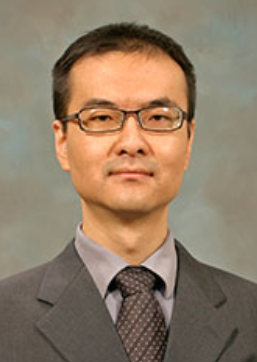Meet Dr. Huanyu Qiao
Written by Dr. Zhibing Zhang (SSR’s Diversity Committee) in celebration of AAPI Heritage Month

The Asian American and Pacific Islander (AAPI) Heritage Month is annually celebrated in the United States during the month of May. This commemoration recognizes the contributions and influence of Asian Americans and Pacific Islander Americans to the history, culture, and achievements of the United States. In celebration of AAPI Heritage Month, Dr. Zhibing Zhang (SSR’s Diversity Committee) sat down with Dr. Joe (Huanyu) Qiao from the University of Illinois at Urbana-Champaign to learn about his work and career.
Dr. Joe (Huanyu) Qiao is an Assistant Professor of Comparative Biosciences in the College of Veterinary Medicine at the University of Illinois at Urbana-Champaign. He is the Principal Investigator of a research group that focuses on the molecular mechanisms of meiotic checkpoint pathways controlled by RNF212 in mammals. Here, he shares a little more about his work, career and some thoughts on the challenges that he faced during the pandemic:
Currently, my research lab at the University of Illinois has three main areas of focus, all related to meiosis, a critical process for sexual reproduction and biological inheritance. Meiotic defects can lead to infertility, miscarriage, or birth defects, making it essential to study this process. The first major area of research in my lab is on oocyte quality control, which I secured NIH R00 funding for after establishing my lab. With more women delaying childbirth, understanding the mechanisms that control reproductive lifespan becomes increasingly important. In mammals, including humans, oocytes form before birth, with human oocyte numbers decreasing from six million to one million around birth. The remaining oocyte pool after perinatal loss is a key determinant of female reproductive lifespan, with oocyte quality control eliminating those with meiotic defects. We have discovered that RNF212, a SUMO E3 ligase, mediates this process, serving as a link between SUMOylation and oocyte quality control.
The University of Illinois has a renowned physics program, with several Nobel Prize winners among the faculty. Building on this expertise, my lab’s second project focuses on the biophysical properties of meiotic chromosomes. We have received NIH R01 funding from NIGMS based on our ability to isolate spindles and single meiotic chromosomes to measure their physical properties. We have also developed computational approaches to study meiotic chromosomes in terms of transcription and 4D genome, and a single-cell RNA-seq based “digital chromosome banding” method to distinguish real and pseudo sex bodies.
Finally, my lab has also explored the impacts of toxicants on meiosis, a new project within the vibrant toxicology program at the University of Illinois. We have already published four papers on the effects of environmental toxicants on meiosis, including PFAS, phthalate, and water disinfection byproducts. These toxicants can have transgenerational and multigenerational adverse effects via meiosis, making it crucial to study their impacts. Overall, the research conducted in my lab has the potential to make significant contributions to our understanding of meiosis and its impacts on reproductive health, biophysics, and toxicology.
1. What is your current position, and what does it entail?
As an assistant professor at the University of Illinois, Urbana-Champaign, my position entails research, teaching, and service. I lead a research group focused on meiosis, a cell division process essential for sexual reproduction and biological inheritance. In addition to conducting research, I also teach courses and mentor students.
2. Can you talk a little bit about yourself, where are you from? What first attracted you to the world of science? And how did you get to be in your current position?
I am originally from China and came to the United States for a graduate research assistant position at Colorado State University. After completing my Ph.D. degree, I did a postdoctoral training in Dr. Neil Hunter’s lab, which prepared me for my current position as an assistant professor. I was drawn to the world of science by my curiosity for the unknown. Science allows us to explore and understand the mysteries of the natural world. Both Ph.D. and postdoctoral trainings position me into the current position.
3. What impact has the pandemic had on your daily activities and your research?
The pandemic has significantly impacted my research and teaching activities. Due to restrictions, we had to cut down our mouse colonies, and our research was disrupted constantly. It also forced us to adapt to new ways of teaching and communicating with our colleagues and students.
4. Have you gained any valuable lessons from life during the pandemic?
The pandemic has reminded me of the importance of community, especially during times of crisis. I have learned to appreciate the kindness and deeds of others. I have also learned to be resilient and adapt to new ways of living and working.
5. What are you most excited to do over the next year?
I am excited to see the results of our ongoing research projects and hope to make significant contributions to science from my lab.
6. What words of inspiration would you like to share with the future generation of scientists?
I would like to share an ancient wisdom from Chinese culture that life is like playing the violin. We need to adjust the strings well, not too tight, not too loose, to create harmony. Balance is important in both life and work, and it is essential to take care of ourselves while pursuing our passions in science.
7. Are there ways in which you think your heritage has affected your perspective or career trajectory?
Growing up in Chinese culture, I was influenced by the emphasis placed on education and hard work. This may have played a role in my career choice as a scientist, as I was drawn to the idea of exploring the unknown and making new discoveries through research.

